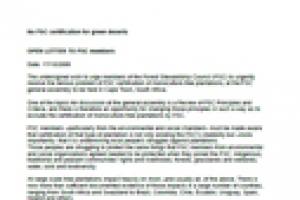Being “carbon neutral” seems to have become fashionable. The World Bank, the Vatican, the World Olympics, the Football World Cup, the Body Shop, the Rolling Stones, and a long list of celebrities proclaim themselves to be totally or partially “carbon neutral”. Even Mercedes Benz recently held in California what was described as “the world’s first ever carbon neutral fashion week”! It is therefore understandable that the New Oxford American Dictionary has proclaimed "carbon neutral" as its Word of the Year for 2006.
United States
Bulletin articles
17 October 2007
In August 2007, ArborGen signed an agreement which brings the company's aim of being "the pre-eminent player in the global development and marketing of bio-engineered trees to the forestry industry" another dangerous step closer to reality.
Bulletin articles
17 September 2007
Indigenous Peoples have achieved a major victory at the United Nations level. After more than 20 years of negotiations, on September 13 the United Nations General Assembly finally adopted the United Nations Declaration on the Rights of Indigenous Peoples.
Other information
23 May 2007
The US South Carolina-based company ArborGen is a partnership between the timber corporations International Paper and Mead Westvaco, and the New Zealand-based Genesis Research and Development. ArborGen has been growing GE Eucalyptus hybrid trees and testing them for cold tolerance on a secret 1-acre plot in Baldwin County, Alabama, close to the Gulf Coast of Mexico. The place was found to be home to a number of experimental, genetically modified crops, many of which appear to be growing on a Loxley farm owned by agricultural giant Monsanto Co.
Bulletin articles
24 March 2007
No one in their right mind can accuse President George W. Bush of overly concerning himself with climate change. In this respect, his curriculum is spotless and both his unreserved support to the oil industry and his oil wars have implied significant inputs to global warming. And if any doubts were left, his persistent refusal to sign the Kyoto Protocol has made him the undisputed leader of those making the largest contribution to the destruction of Planet Earth’s climate.
Bulletin articles
24 March 2007
If we want to curb climate change, carbon trading won't do.
In 1992, an infamous leaked memo from Lawrence Summers, who was at the time Chief Economist of the World Bank, stated that "the economic logic behind dumping a load of toxic waste in the lowest wage country is impeccable, and we should face up to that".
The recently released Stern Review on climate change, written by a man who occupied the same position at the World Bank from 2000 to 2003, applies a similar sort of free market environmentalism to climate change.
Other information
5 March 2007
Only available in Spanish -
Por Raúl Zibechi
Bulletin articles
30 November 2006
The US Department of Energy's Office of Biological and Environmental Research (DOE) is funding a $1.4 million, three-year study by Purdue faculty members to determine ways to alter lignin and test whether the genetic changes affect the quality of plants used to produce biofuels. A hybrid poplar tree is the basis for the research that is part of the DOE's goal to replace 30 percent of the fossil fuel used annually in the United States for transportation with biofuels by 2030.
Bulletin articles
30 October 2006
The volume of fossil fuels burnt by the “oil” civilization in one year contains an amount of organic matter equivalent to four centuries of plants and animals.
Bulletin articles
30 October 2006
The World Bank has become the main international trader of carbon credits. Its new role gives rise to a series of conflicting interests.
Bulletin articles
30 October 2006
The 9th Conference of the Parties of the United Nations Convention on Climate Change held in Milan in 2003 allowed Northern companies and governments to establish plantations in the South under the Kyoto Protocol’s “Clean Development Mechanism” (CDM), allegedly to absorb carbon dioxide and to store carbon. COP-9 allowed the use of plantations of genetically engineered (GE) trees [also known as genetically modified, GM, or transgenic trees] as carbon sinks, that is to supposedly offset carbon emissions
Other information
30 October 2006
The International Union of Forest Research Organizations (IUFRO) conference “Forest Plantations Meeting: Sustainable Forest Management with Fast Growing Plantations” 10-13 October, 2006 encountered heavy opposition by several environmental and ecological justice groups.

